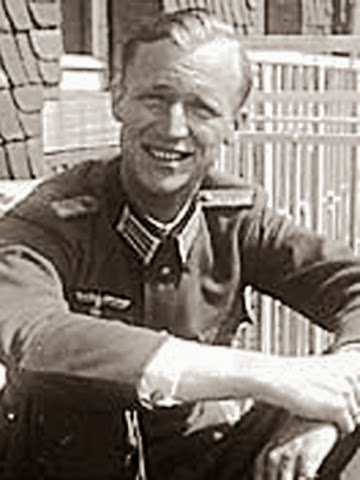Eberhard von Breitenbuch
In 1943 General Tresckow, Chief of Staff of Army Group Centre on the Russian front, arranged for a young Captain – Eberhard von Breitenbuch – to join his staff. Tresckow was a key figure in the resistance to Nazism. From this position, Breitenbuch was appointed aide to Field Marshal Busch, the new
commander of Army Group Centre.
In March
1944, Tresckow learned that Busch, along with Breitenbuch, would fly to the
Berghof to confer with Hitler. Tresckow, together with fellow conspirator Major Hans-Ulrich von Oertzen, hurried to see Breitenbuch. They asked to speak with
him privately.
Breitenbuch
took the two officers into his bedroom. General Tresckow referred to the
proposed visit to the Führer. He asked if Breitenbuch realised the
responsibility he would be carrying that day. Tresckow told him he would be
holding Germany’s fate in his hands. It would depend on him whether this
miserable war and its air raids on women and children, and its hundreds of
thousands of casualties, would continue.
At the end
of this speech, Breitenbuch indicated he was prepared to take on the task.
Oertzen smiled, producing a small metal bomb which looked like a hand grenade.
Success with this bomb was a certainty, he explained. It could be concealed
beneath a tunic. At some suitable moment he could activate the timer and hold
Hitler until it exploded. The timer could be set to three seconds before going
in to the conference, and then activated by pressing a small button.
Breitenbuch
was taken aback. There would be no opportunity to test this bomb. He was
prepared to sacrifice his life, but he had to be sure that he would kill
Hitler. In the end, Breitenbuch was only willing to make a pistol attack on the
Führer. Tresckow had to accept this, but warned him to aim for the head or neck
– protective clothing made other shots less likely to succeed.
On 11 March
1944, after travelling from the front, Field Marshal Busch and Captain
Breitenbuch reached Berchtesgaden for their conference with Hitler. One of
Hitler’s powerful Mercedes met them for the drive up to the Berghof. They
arrived early, waiting for some time in the anteroom to the conference hall. As required, Breitenbuch removed his cap, and his belt with his service revolver. He kept
his loaded Browning pistol in his trouser pocket. He clutched Field Marshal
Busch’s briefcase, filled with papers for the briefing.
In Berlin,
the conspirators were forewarned. Initial preparations for the coup were set in motion. Claus von Stauffenberg followed events and had high hopes that this time the assassination would take place.
Breitenbuch
waited as more and more officers gathered. At last the doors to the hall swung
open. An SS officer announced that the Führer invited the gentlemen to enter.
In order of seniority, the officers went in. Busch was the only commander from
the front present. Breitenbuch, the only aide, was to enter last.
Just as Breitenbuch
was about to enter, the SS officer grasped his arm. The officer said that aides
were not to be present in the conference that day. Both Breitenbuch and Busch
protested. The SS officer stood firm. Field Marshal Busch had to take the
briefcase.
Breitenbuch
waited in the anteroom as the conference proceeded. From time to time, SS men
walked through the anteroom, looking closely at him. He had to remain outwardly
calm. Was his plan suspected? Had someone blown his cover? Why else had he been
excluded? Weren’t aides always allowed in? How to get rid of his pistol?
Eventually,
Field Marshal Busch emerged. Breitenbuch left with him – his plan undetected.
The reason for tightening of security on that day remains unclear, but
Breitenbuch was not prepared to risk such an attempt again.
Edited extract from TREASON: Claus von Stauffenberg and the Plot to Kill Hitler

No comments:
Post a Comment